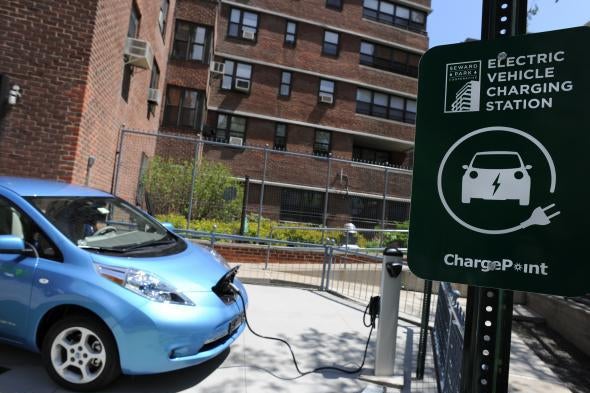Early last month, a police officer approached Kaveh Kamooneh outside of Chamblee Middle School in Georgia. While his 11-year-old son played tennis, Kamooneh was charging his Nissan Leaf using an outdoor outlet. When the officer arrived, he opened the unlocked vehicle, took out a piece of mail to read the address, and let a puzzled Kamooneh know that he would be arrested for theft. Kamooneh brushed the entire incident off. Eleven days later, two deputies handcuffed and arrested him at his home. The charge? Theft of electrical power. According to a statement from the school, a “local citizen” had called the police to report the unauthorized power-up session.
The total cost of the 20 minutes of electricity Kamooneh reportedly used is about 5 cents. So why did he end up in jail for 15 hours? Sgt. Ernesto Ford of the Chamblee Police Department dismissed the idea that it wasn’t worth arresting someone over a nickel, telling reporters that “It doesn’t matter. He broke the law. He stole something that wasn’t his. … A theft is a theft.” (The police dispute Kamooneh’s account, saying in a statement that he, not his son, was the one playing tennis and that Kamooneh was not supposed to be on school grounds. The statement also says, “He made no attempt to apologize or simply say oops and he wouldn’t do it again.”)
Are political attitudes toward environmentally friendly electric vehicles to blame? North Carolina legislators proposed (and later abandoned) a bill to ban Teslas in the state, citing a need to prevent “unfair competition.” (These are the same legislators who celebrate their own “free-market reforms.”) A similar effort in Ohio also failed. Outgoing Virginia Gov. Bob McDonnell, a Republican, proposed a $100 annual fee levied against “alternative fuel” car owners. In New Jersey, one Democratic politician suggested electric car owners to pay a mileage-based tax. But Georgia has a handful of initiatives to promote electric vehicle ownership. What gives?
Kamooneh’s case is different, of course, because it involves using a public outlet to juice up the battery. In a way, this is also more troubling. With the growing popularity of electric vehicles outpacing the infrastructure enhancements needed to keep them charged, this problem could become increasingly common. Or could Kamooneh’s misfortune simply be a case of overzealous and reactionary law enforcement officers proving a perverse point?
I recently used a public outlet in New York City during a desperate attempt to juice up my dying smartphone, and law enforcement didn’t come after me. The only risk I considered was my unprotected USB. Undoubtedly, thousands of Americans have stopped to plug in various devices at cafes, airports, convention centers, schools, and parks across the country when they need a quick charge. Are we guilty of theft, or are we simply using publically available outlets in a pinch?
Of course, there is a precedent: The practice of piggybacking Wi-Fi has been around since the dawn of wireless Internet. While there have been a handful of arrests for Wi-Fi theft, it remains a common practice among the general public. Unlike electrical grids, however, unauthorized access to a Wi-Fi network can lead to a whole host of ugly problems—including use of the network for criminal activity. Strong password protections can easily solve the problem. Should we start protecting electrical outlets in a similar way?
One solution would be to cover and lock public outlets when not in use, or to switch off power from a control room outside of business hours. A more practical solution is to implement some kind of reasonable use policy. The costs of charging an electric car are difficult to calculate but generally rather low; a few minutes at a public outlet won’t exactly drain the public coffers. Plus, public outlets charge cars incredibly slowly, often requiring up to 15 hours for a full charge. (In contrast, a top-of-the-line charging station can boost a battery in as little as 30 minutes.) For his misdemeanor, Kamooneh spent about 15 hours in jail, or just long enough to charge his car from a public outlet. If only Georgia had more charging stations, he could have powered up in a fraction of that time—and avoided a night at the police station, too. Until the infrastructure catches up with electrical vehicles, it should be considered fair game for drivers to plug in at publicly available outlets.
Update, Dec. 5, 2013: This post has been updated to include a statement from the police about the incident.
